Japanese Studies in Israel as a Micro-cosmos of Japanese Studies in the World
Ben-Ami Shillony
Nissim Otmazgin
Department of East Asian Studies, The Hebrew University of Jerusalem
What brings students to study about Japan these days?
Unlike during the 1980s, when the Japanese economy was a major source of attraction for students across the world, nowadays it is Japanese contemporary culture and lifestyle which draws students into class. As any lecturer in Japanese studies can testify, students are no longer interested in Japanese corporate culture, managerial techniques, and the economy, as much as in manga, anime, video games, J-pop and Japanese fashion. Young people across the globe may not have heard of Prime Minister Noda Yoshihiko, or about Keidanren, Japan's once powerful business organization, but they very well know about Pokémon, Draemon and Hello Kitty, they buy manga, anime, and video games in their tens of millions, and many are fascinated by the bubbly urban culture coming from Tokyo.
It would be no exaggeration to say that the world's interest in and admiration of Japanese pop culture has grown dramatically over the past two decades. The outreach of Japan's pop culture goes far beyond the borders of that country and keen interest in Japanese pop culture commodities, especially anime and manga, is exhibited not just in neighboring countries, but also in Europe, North America, the Middle East, and Africa. The increase in the number of students learning Japanese is an indication of the fascination for Japan's pop culture. According to the Japan Foundation, Japanese language studies have never been so popular, due to the consumption of manga and anime by young audiences abroad. The number of people studying the Japanese language outside of Japan has increased from 127,161 in 1979 to 3,651,232 in 2009.
Pop culture as a trigger
Japanese pop culture is not only fascinating from a cultural and artistic point of view; it is also extremely powerful in drawing people to study other aspects of Japan. Let us give two examples from our own experiences.
Ben-Ami Shillony:
When I was first drawn to the study of Japan in the mid-1960s, my main interest lay in the connection between the traditional culture and values of Japan and Japan's modern history, like its wars, its political institutions and its economic achievements.
Nissim Otmazgin:
My first image of Japan, as far as I can remember, was of a society populated entirely by sword-wielding samurai. This image was created through watching the American-made drama Shogun, at the age of 10 or 11. Back then, I was fascinated by the way Japan--its culture and its people--were depicted in this drama. Thereafter, this fascination encouraged me to pursue my interest in things I regarded as "Japanese", such as karate, zen, and sushi, which, in turn, brought me to pay special attention to any newspaper article that talked about "Japan". In my early twenties, when I decided to travel and study abroad, the choice of Japan was clear.
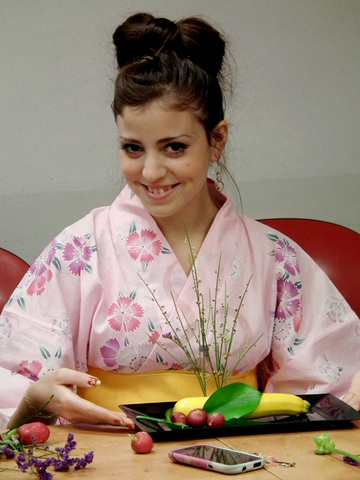
Israeli students are interested in traditional culture as well as pop culture. A scene from a flower arrangement workshop at the international symposium held in May 2012. (Photo by Alina Imas)
Japanese studies in Israel
Japanese Studies in Israel, as part of East Asian Studies in general, have gone a long way in the past few decades to become one of the most thriving fields in the faculties of Humanities and Social Sciences of the Israeli universities. From the modest beginning of the Department of Chinese and Japanese Studies established at the Hebrew University of Jerusalem in the early 1960s, the field has dramatically expanded in the past 25 years to include three major departments of East Asian Studies at the universities in Jerusalem, Tel-Aviv and Haifa, and an increasing number of East Asian Studies programs offered by other universities and colleges throughout Israel. Extraordinarily high enrollment figures in these departments and programs testify to their unprecedented popularity among young Israelis.
Relative to its population size (7.6 million), Israel has one of the world's highest rates of researchers and students in Japanese studies. There are more than 30 professional scholars who hold a PhD degree in this field or in other disciplines with a research focus on Japan. There are tens of Japanese language teachers at various universities, colleges, and language schools, and more than 300 undergraduate and graduate students majoring in Japanese studies at Israeli universities. Each of the three major universities that offer a comprehensive program in Japanese studies developed its own emphasis: the Hebrew University of Jerusalem emphasizes Japanese history and politics, Tel Aviv University offers various courses in traditional Japanese art, culture, and religion, and Haifa University has a strong focus on modern Japanese society and culture.
As part of developing Japanese studies in Israel, we emphasize the use of Japanese materials for research. In recent years, we have made great efforts to offer Japanese books and data base to our students. Thanks to the generosity of private donors, the Japan Foundation, the Japanese Embassy in Israel, and with the support of the Frieberg Center for East Asian Studies, at the Hebrew University we have been able to build a collection of more than 3,000 books in Japanese, focusing on Japanese history, society, and language. These books are available for our researchers and students at a designated section in the library. In addition, the Jewish National and University Library in Jerusalem carry about 10,000 books in Japanese. Haifa University holds a collection of over 2,000 books in Japanese as well as an audio-visual collection of about 500 videos and DVDs on Japan. At Tel Aviv University there is a similar collection of Japanese books about Japanese history, literature, and religion. We hope to expand the collection and purchase a few important Japanese language data bases so that our students learn and conduct research on Japan relying directly on primary and secondary sources in Japanese and not only read about Japan in English.
What do we teach the students?
While the majority of students chose to major in Japanese studies because they were initially interested in Japanese pop culture, when they come to the university we ask them to take courses in the history, culture, and politics of Japan. Japanese studies at the university include various courses on Japan's pre-modern and modern history, Japanese traditional culture, Japanese art, society, politics and foreign relations--in addition to Japanese language.
For example, in the last academic year (2011-12) the courses offered at the Department of East Asian Studies at the Hebrew University included Japan's pre-modern history, Japan's modern history, Japan's politics and foreign relations, introduction to Japanese art, Japanese performing arts, society and family in contemporary Japan, Japanese cinema and avant-garde, postwar Japan as a liberal democracy, Japanese presence and influence in Southeast Asia, Japan during World War II, Zen Buddhism in Japan, Japanese labor organization and corporate culture, Japan's visual culture before and after the bubble, Japanese art of the Edo period, research methods in Japanese politics and society, women, consumption and identity in modern Japan, readings in Japanese literature, and different levels of Japanese language courses (reading, writing, and spoken Japanese).
From time to time we offer courses on Japanese pop culture and hold special lectures and seminars on that topic. At the Hebrew University of Jerusalem, students interested in pop culture are also invited to join Nippon, a club for students interested in Japanese contemporary society and culture (in Israeli universities you don't usually find students clubs similar to what you see at universities in Japan or the US). The students belonging to this club occasionally meet to discuss their common interests and exchange views. They also organize special movie screenings and lectures on topics related to Japanese animation, literature, cinema, and music. At Tel Aviv University, there is a Japanese Cinema Club where once a week the students gather, screen and discuss Japanese movies. And at Haifa University, the students sometimes arrange special "Japan Evenings" with various Japan- related cultural activities and food.
International Symposium on Japanese Studies in Israel
In May 7-9, 2012, on the occasion of the 60th anniversary of the establishment of diplomatic relations between Japan and Israel, we held a special symposium at the Hebrew University of Jerusalem with the participation of scholars from Israel and from abroad to reflect on the history of Japan-Israel relations and to discuss future prospects and opportunities. The symposium, titled Israel and Japan: Regional, Bilateral, and Cultural Perspectives, was the biggest of its kind ever to take place in Israel. The symposium was both a milestone in the cultural and educational relations between Japan and Israel and an intellectual project with a broad academic and theoretical value. The entire event was also a chance to reflect on the state of Japanese studies in Israel as a micro-cosmos of the development of Japanese studies outside Japan and the United States.
In that symposium, supported by the Japan Foundation, a group of 58 distinguished scholars from Israel and abroad took part in the three day discussion, in addition to about 800 students and visitors (for the list of participants and abstracts go to http://eastasia.huji.ac.il/japan-israel-2012/index.html).
The papers at the symposium were organized around three main clusters. In the first cluster, titled Japan in Asia vs. Israel in the Middle East, the participants attempted to draw analytical and theoretical insights from these two seemingly different situations--Japan in Asia and Israel in the Middle East--and discuss the possible roles of diplomacy, commerce, and culture in the transitional processes toward peace.
The second cluster was titled Geopolitics and Diplomacy in Japan-Israel relations. Here the central idea was not only to look at Japan's diplomacy in the Middle East and particularly toward Israel, but also to examine the reciprocity between diplomacy and "hard" interests. Among the topics raised were: To what degree did the question of resources influence the relations? What about each country's mutual relations with the U.S.? Does diplomacy play a vital role in constructing relations or are the relations mainly the result of interests and international politics?
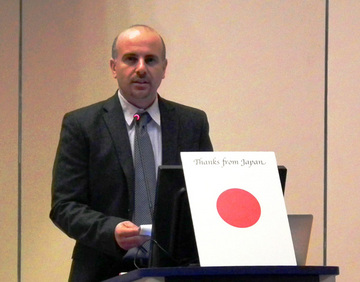
Co-writer Nissim Otmazgin gives a presentation on "Geopolitics and Soft Power: Japan's Cultural Policy and Cultural Diplomacy in Southeast Asia."
The final cluster, Japanese Studies and Culture in Israel discussed the current state of Japanese studies in Israel and more generally examined the role of culture, art, and education in these relations. What impact does Japanese art and culture have on the image of Japan in Israel? What brings students into Japanese studies classes these days? How does the popularity of Japanese contemporary culture affect Israeli youth? What is the right way to teach Japanese language in Israel's higher education? In a broader sense, this panel was also a chance to reflect on the state of Japanese studies in Israel as a micro-cosmos of the development of Japanese Studies in other parts of the world.
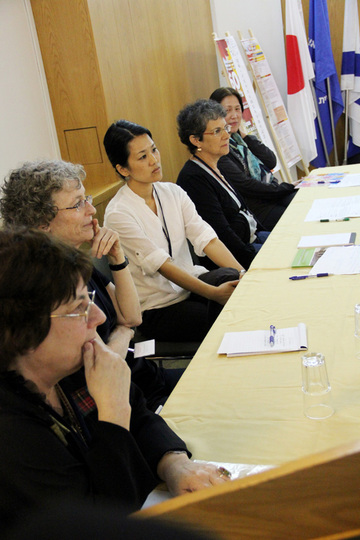
Members of a panel listen intently to talks on Japanese-language education. 58 distinguished scholars from Israel and abroad gave presentations and had lively discussions for 3 days with total of 12 sessions. (Photo by Alina Imas)
On the first day of the symposium we held an opening of two exhibitions of Japanese art in Israel. One exhibition shows the work of four Japanese and Israeli young artists who live in Israel and Japan. The other one, at the library, shows rare books of Japanese art and a Bible scroll (Book of Ecclesiastes) decorated with Hebrew and Japanese calligraphy.
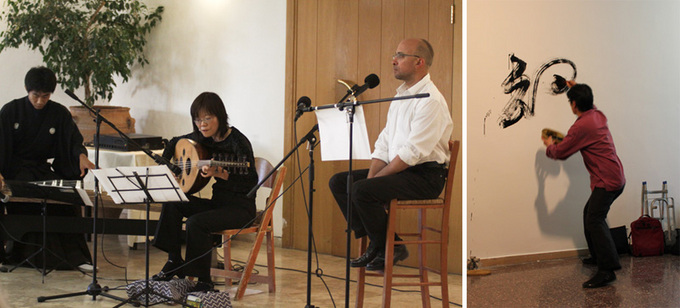
(Left) A Japanese koto in collaboration with an Arabic string instrument oud and a Jewish song charmed the audience at the opening ceremony. (Photo by Alina Imas)
(Right) Kazuo Ishii, a Japanese calligrapher who lives in Israel, drew the kanji for "soul" at the exhibition, which opened at the same time as the symposium. (Photo by Valla Izrailevich)
The Israeli Association for Japanese Studies (IAJS)
During the symposium of May 2012, we announced the establishment of the Israeli Association for Japanese Studies (IAJS) - a cross-university organization made of scholars of Japan in Israel, dedicated to the promotion of research and teaching of Japan in Israel. IAJS is as a non-profit organization which aims are to address the growing academic interest in Israel in the field of Japanese studies, and the need for better coordination among the various researchers and academic institutions working in the field. IAJS seeks to encourage Japanese-related research and dialogue in Israel, to promote Japanese language teaching, to organize symposiums, workshops and conferences in the field of Japanese studies, and to advance the academic ties and collaboration with Japanese studies associations and academic institutions abroad. Most importantly, it wishes to maintain a lively community in the field of Japanese studies in Israel.
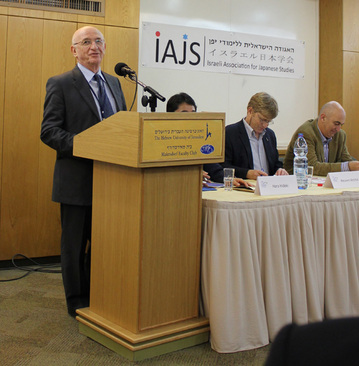
As Honorary President, co-writer Ben-Ami Shillony greeted guests during the inauguration ceremony of the Israeli Association for Japanese Studies. (Photo by Valla Izrailevich)
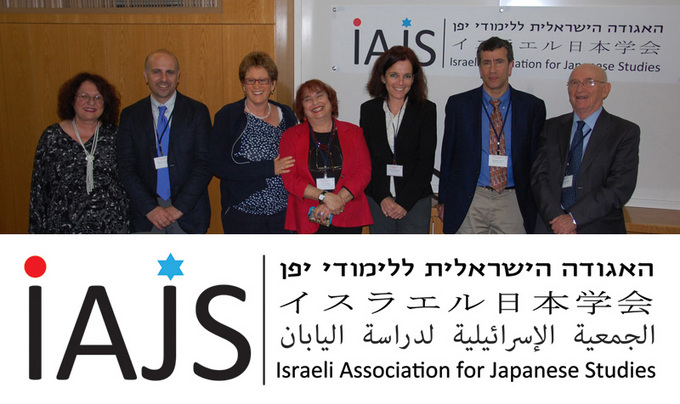
The logo of the Israeli Association for Japanese Studies uses motifs from the flags of both countries. The association is open to researches, students and anyone interested in Japanese studies and language, from both Israel and abroad.
Students spreading the word on Japan
Student of Japan and Japanese pop culture fans in Israel are very active in initiating Japan-related events and are eager to share their knowledge about the country and its culture and make friends with fellow Japanese students. Here we would like to share only three of the ongoing projects initiated and managed by our students.
High schools project
Every year, students from the department of East Asian Studies at the Hebrew University of Jerusalem volunteer to go to high schools in Jerusalem and teach an introductory class about Japan: its geography, some history and culture, and a few words in Japanese. The purpose of this project is to reach out to new layers of Israeli society and introduce the knowledge of Japanese culture and society through interactive presentations given by outstanding students from the department. In the first year (2009-10), the students hesitantly started with eight participating high schools in Jerusalem. The program proved to be highly successful and the students were asked to come again. This year (2011-12), the numbers have surged: twenty university students teach introductory classes about Japan in twelve highs schools and youth movements in Jerusalem in front of approximately 1,200 high school students. For the volunteering university students, it is a chance to share their knowledge and interest in Japan, for the high school pupils it is a chance to expand their minds to a far part of the world they know very little about, and for the high school teachers and principals it is a fruitful interaction between high school pupils and university students.
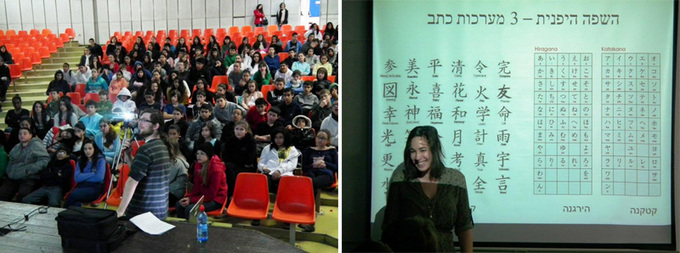
Students majoring in Japanese studies lecture on Japan and the Japanese language to Israeli high school students.
Israeli-Japanese student conferences and meetings
Every year, Israeli students majoring in Japanese studies are meeting with Japanese students coming to Israel. These meetings are organized entirely by the students for the purpose of formulating ties of friendship between Israel and Japan through direct communication between students and, of course, for making friends. At Haifa University, the students regularly host visiting students and delegations of students coming from various universities in Japan, such as Akita University, Keio University, Waseda University, and Dōshisha University. At the Hebrew University, for the past sixteen years the students have annually been meeting with Japanese students interested in the Middle East. The Japanese students usually belong to a cross-university organization called "the Middle East Club." They arrive in Israel after participating in similar conferences with students in Syria, Jordan, and Egypt.
Japan Day at the university
Every year, students majoring in Japanese Studies have been organizing special "Japan Days" at Jerusalem, Tel Aviv, and Haifa, full of events related to Japan: lectures, workshops (origami, sushi-making, ikebana, calligraphy etc.), and performances (tea ceremony, traditional dance, martial arts). The events draw a large number of students and visitors, and help spread the word about Japanese studies on the campus.
Japan in Israel and beyond
By spreading knowledge about Japan, Japanese studies in Israel open new horizons to young Israelis as well as to the general public of Israel. They promote the dialogue between two ancient cultures situated on both sides of Asia. By studying Japan, Israelis realize the existence of non-European cultures which possess rich traditions and different roads to modernity. This is also the message of Japanese studies in other countries outside Japan: To develop our ability to appreciate different cultures, but at the same time to realize the common human traits of all civilizations.
Thus, we teachers and researchers of Japan have two, seemingly contradictory, missions. On the one hand, we point out the unique features of Japanese history, society, religion, art and thought. These unique features were probably the reasons which attracted us to study Japan in the first place and which keep us interested in things Japanese throughout our lives. On the other hand, we make great efforts to show that the Japanese are not as different from others as many people tend to think. Although a peculiarly rich vocabulary is used to describe Japan - including such terms as uchi and soto, oyabun and kobun, omote and ura, tatemae and honne, tateshakai and amae - actually similar traits are found in many other societies. One of our important contributions to Japanese studies is to show that the Japanese are basically not different from other peoples and that below the cultural different codes lies a common human society that craves the same things and is afraid of the same things as all of us.
We are often asked by our students whether it is possible "to understand the Japanese mind." Our answer is: yes, it is possible to understand the Japanese mind in the same way as it is possible to understand the mind of any human society. But to do that, one should be humble and willing to make the right effort. We tell our students that to understand the Japanese one should first of all learn Japanese, because language is the key to the understanding any culture. Then one should recognize the values that were dominant in each society in each period, without assuming that his or her present values are the only "correct" ones. We should study the Japanese in the same way we would like them to study us. In that way there may be less conflict, suspicion and animosity between nations and cultures.
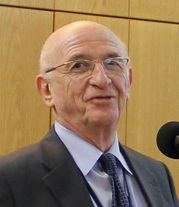 Ben-Ami Shillony (Phd Princeton University) is Professor Emeritus of Japanese history and culture at the Hebrew University of Jerusalem and Honorary President of the Israeli Association for Japanese Studies. He is recipient of the Order of the Sacred Treasure and the Japan Foundation Award. He wrote books in English, Japanese and Hebrew.
Ben-Ami Shillony (Phd Princeton University) is Professor Emeritus of Japanese history and culture at the Hebrew University of Jerusalem and Honorary President of the Israeli Association for Japanese Studies. He is recipient of the Order of the Sacred Treasure and the Japan Foundation Award. He wrote books in English, Japanese and Hebrew.
 Nissim Otmazgin (PhD Kyoto University) is a Lecturer of Japanese modern history and politics at the Department of East Asian Studies, the Hebrew University of Jerusalem, and Chair of the Israeli Association for Japanese Studies. He wrote and co-edited book on the politics and economy of Japanese popular culture in Asia.
Nissim Otmazgin (PhD Kyoto University) is a Lecturer of Japanese modern history and politics at the Department of East Asian Studies, the Hebrew University of Jerusalem, and Chair of the Israeli Association for Japanese Studies. He wrote and co-edited book on the politics and economy of Japanese popular culture in Asia.
For watching videos and pictures from the symposium go to:
Opening Ceremony: http://youtu.be/rpv3TBDAmp0
Keynote Speech by Professor Sheldon Garon of Princeton University: http://youtu.be/0R47WIA_874
Panel 1, Japan and Israel in their regional contexts: http://youtu.be/BUe3bkxE1ms
Panel 4, geopolitics and diplomacy in Japan-Israel relations: http://youtu.be/pEncDlNTwaM
Panel 7, contemporary Japanese culture and design in Israel: http://youtu.be/yzHteb0VtpY
IAJS Inauguration Ceremony: http://www.youtube.com/watch?v=Ll4XnDee-1U
Pictures
Day I: https://www.facebook.com/media/set/?set=a.10150775389731507.389407.630011506&type=1
Day II: https://www.facebook.com/media/set/?set=a.10150777151551507.389551.630011506&type=1
Day III: https://www.facebook.com/media/set/?set=a.10150777302701507.389560.630011506&type=1
Related Events
Keywords
- Anime/Manga
- Pop Culture
- Traditional Arts
- Film
- Music
- Japanese Studies
- Japanese-Language Education
- Japan
- Israel
- Department of East Asian Studies
- The Hebrew University of Jerusalem
- Pokémon
- Draemon
- Hello Kitty
- Video games
- J-pop
- Karate
- Zen
- Sushi
- Jerusalem
- Tel-Aviv
- Haifa
- Tel Aviv University
- University of Haifa
- The Louis Frieberg Center for East Asian Studies
- Kazuo Ishii
- Israeli Association for Japanese Studies
- IAJS
Back Issues
- 2025.7.31 HERALBONY's Bold Mis…
- 2024.10.25 From Study Abroad in…
- 2024.5. 2 People-to-People Exc…
- 2022.11. 1 Inner Diversity<3> <…
- 2022.9. 5 Report on the India-…
- 2022.6.24 The 48th Japan Found…
- 2022.6. 7 Beyond Disasters - …
- 2021.3.10 Crossing Borders, En…
- 2020.7.17 A Millennium of Japa…
- 2020.3.23 A Historian Interpre…

